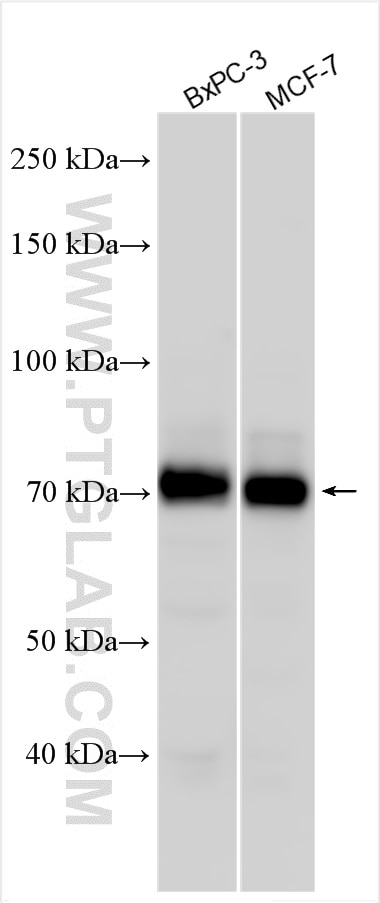Tested Applications
| Positive WB detected in | BxPC-3 cells, MCF-7 cells |
Recommended dilution
| Application | Dilution |
|---|---|
| Western Blot (WB) | WB : 1:500-1:2000 |
| It is recommended that this reagent should be titrated in each testing system to obtain optimal results. | |
| Sample-dependent, Check data in validation data gallery. | |
Product Information
55108-1-AP targets ATP13A3 in WB, ELISA applications and shows reactivity with human samples.
| Tested Reactivity | human |
| Host / Isotype | Rabbit / IgG |
| Class | Polyclonal |
| Type | Antibody |
| Immunogen | Peptide Predict reactive species |
| Full Name | ATPase type 13A3 |
| Calculated Molecular Weight | 138 kDa |
| Observed Molecular Weight | 78 kDa |
| GenBank Accession Number | NM_024524 |
| Gene Symbol | ATP13A3 |
| Gene ID (NCBI) | 79572 |
| RRID | AB_3670238 |
| Conjugate | Unconjugated |
| Form | Liquid |
| Purification Method | Antigen affinity purification |
| UNIPROT ID | Q9H7F0 |
| Storage Buffer | PBS with 0.02% sodium azide and 50% glycerol, pH 7.3. |
| Storage Conditions | Store at -20°C. Stable for one year after shipment. Aliquoting is unnecessary for -20oC storage. 20ul sizes contain 0.1% BSA. |
Background Information
ATP13A3 is a member of the P-type ATPase family of proteins that transport a variety of cations across membranes. ATP13A3 is a novel member of the enigmatic mammalian PTS that contributes to cellular polyamine uptake and is implicated in disease(PMID: 33310703). Mutations in ATP13A3 cause Primary Pulmonary Hypertension 5(PMID: 30679663, 34493544). ATP13A3 can be detected as 78 kDa representing a truncated isoform of ATP13A3 as reported (PMID: 35260637).
Protocols
| Product Specific Protocols | |
|---|---|
| WB protocol for ATP13A3 antibody 55108-1-AP | Download protocol |
| Standard Protocols | |
|---|---|
| Click here to view our Standard Protocols |



